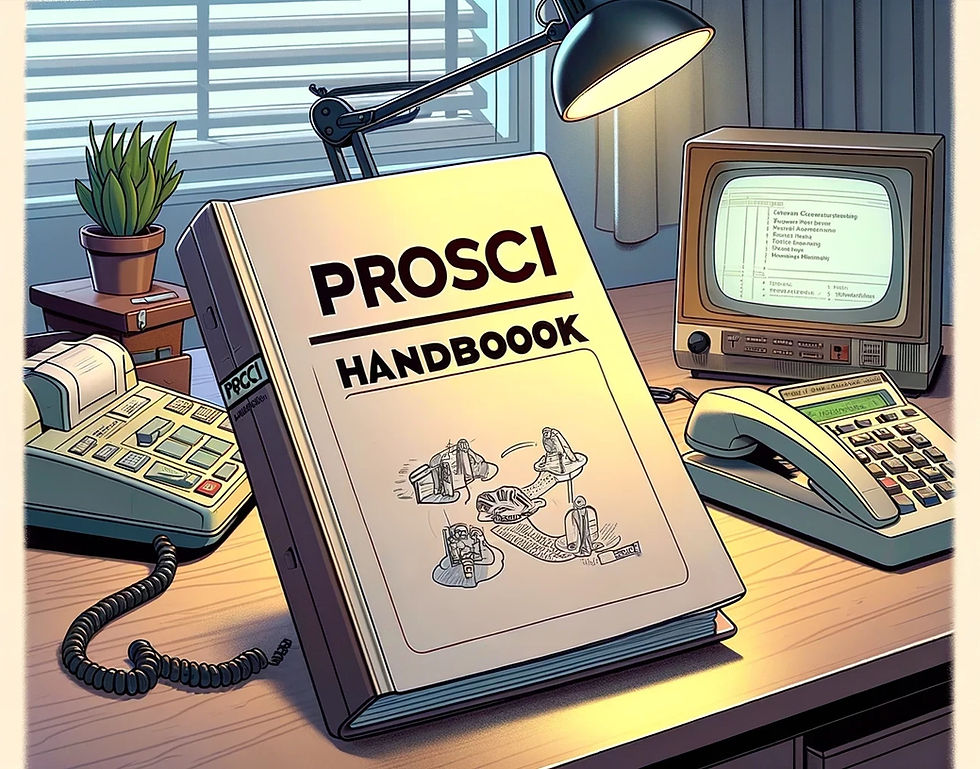Best Practices in Change Management: A Comprehensive Guide
- Hannes Stoop - Verwey

- May 27, 2024
- 3 min read

Change is inevitable, but success in managing change isn't. In today's dynamic business environment, organisations face constant shifts, from digital transformations to market disruptions.
Understanding Change Management Best Practices
The Foundation: Prosci's Research
Established more than two decades ago, Prosci has been a leader in the field of change management research. The report titled "Best Practices in Change Management" has served as an international standard for change executives. Through an examination of the feedback provided by tens of thousands of change practitioners, executives, and consultants, Prosci has discerned seven fundamental best practices that consistently support the achievement of successful change endeavours.

Mobilise Active and Visible Executive Sponsorship:
The cornerstone of successful change initiatives is active and visible executive sponsorship. Leaders who champion change, make informed decisions, and maintain direct communication with project and change management teams significantly increase the likelihood of project success. Prosci's research shows a direct correlation between effective sponsorship and meeting project objectives, emphasising the critical role of leadership in driving change.
Apply a Structured Change Management Approach:
A structured approach to change management provides clarity, consistency, and scalability across initiatives. Organisations that adopt formal methodologies and processes experience higher levels of change management effectiveness. By establishing clear frameworks and allocating resources strategically, organisations can navigate change more efficiently and achieve desired outcomes.
Engage with Front-Line Employees: Engaging front-line employees throughout the change process is vital for successful implementation. This includes understanding their perspectives, addressing concerns, and providing necessary support and training. By focusing on "What's in it for me?" (WIIFM) for employees and involving them in the change journey, organizations create a culture of ownership and commitment towards change objectives.
Communicate Frequently and Openly: Effective communication is a linchpin of change management. Organisations must adopt a multi-channel communication approach that ensures transparency, consistency, and relevance. Tailoring messages to different stakeholders, leveraging preferred senders, and addressing both personal and business impacts of change are key strategies for fostering engagement and alignment.
Engage and Integrate with Project Management: Integrating change management with project management activities enhances alignment and coordination. Collaboration between change and project teams ensures that change initiatives are well-integrated into overall project plans, timelines, and deliverables. This synergy leads to streamlined processes, reduced resistance, and improved project outcomes.
Dedicate Change Management Resources: Allocating dedicated resources and funding for change management is crucial for its success. This includes having skilled change practitioners, adequate budgeting, and establishing a change management team or community. Organisations that prioritise change management resources experience higher effectiveness and better project outcomes.
Engage with and Support People Managers: People managers play a pivotal role in driving change at the team level. Supporting managers with training, communication tools, and alignment sessions empowers them to lead their teams through change effectively. Addressing manager resistance and involving them early in the change process are key strategies for building organizational resilience to change.
Applying These 5 Best Practices in Your Organisation
Implementing these best practices requires a holistic approach that integrates people, processes, and technology. DLK offers tailored solutions and expertise to help organisations navigate change successfully. Here are actionable steps to apply these best practices in your organization:

Assess Your Change Readiness: Conduct a thorough assessment of your organisation's change readiness, including leadership commitment, organisational culture, and change management capabilities.
Develop a Change Management Strategy: Create a comprehensive change management strategy aligned with business objectives. Define roles, responsibilities, and communication channels to ensure clarity and accountability.
Build Change Capability: Invest in building change management capabilities across your organisation. Provide training, resources, and support to equip leaders, managers, and employees with the skills needed to navigate change effectively.
Measure and Adapt: Establish key performance indicators (KPIs) to measure the effectiveness of your change initiatives. Continuously gather feedback, analyse results, and make data-driven adjustments to improve change outcomes.
Promote a Culture of Continuous Learning: Foster a culture that embraces change and continuous learning. Encourage collaboration, knowledge sharing, and innovation to drive ongoing improvement and resilience in the face of change.
Leveraging Prosci's Interactive Data
DLK also leverages Prosci's interactive data tools to enhance change management insights. By customising data based on industry, organisation size, and project type, we provide tailored recommendations and benchmarks for your specific change initiatives. Our goal is to empower you with actionable insights that drive meaningful and sustainable change within your organisation.

Conclusion
Change management is not just a process; it's a strategic imperative for organisations seeking to thrive in today's dynamic landscape.
By adopting best practices, leveraging data-driven insights, and partnering with experienced change management experts like DLK Group, you can navigate change with confidence, drive successful outcomes, and build a resilient, agile organization for the future.
Make sure to check out our Change Manager Pro - Zoleka Mashiyi's golden nuggets of wisdom on this topic: https://www.dlkgroup.com/post/zoleka-mashiyi-change-management-tips
